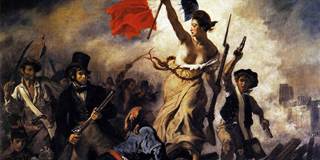Liberalism, the set of ideas that has underpinned Western political and economic systems since the Enlightenment, now appears to be in crisis. This has prompted a welcome debate among well-meaning liberals, but it has also opened the door to opportunists who would impose their deeply anti-liberal – and anti-democratic – vision on society.
PRINCETON – The causes and consequences of what is often described as “the rise of populism” are matters of deep dispute. But if there is one thing everyone can agree on, it is that populism is primarily an attack on liberalism. As such, a number of avowed liberals have authored books in which they take a long, hard look at their own values and institutions, even as other critics call for liberalism to be rolled back.
In principle, public debate should benefit from a chastened, self-critical liberalism. Yet as the books under consideration here show, criticism of the liberal project often depends on a cartoonish rendering of liberalism itself. As a result, the political crises afflicting many of the world’s democracies come to seem as if they are part of the same problem, for which there might be a straightforward fix.
Self-Inflicted Wounds
Start with Edward Luce, the Financial Times’ chief US commentator, whose The Retreat of Western Liberalism is an attempt to “save liberalism from itself.” Through lucid, accessible prose, Luce argues that there is one clear reason why liberalism is in urgent need of rescue: it’s the economy, stupid. For at least a generation, he notes, inequality has been rising and social mobility has been falling. Between one-half and two-thirds of citizens across the West have seen their incomes stagnate; in the United States, median household income is below its level at the beginning of the century.

PRINCETON – The causes and consequences of what is often described as “the rise of populism” are matters of deep dispute. But if there is one thing everyone can agree on, it is that populism is primarily an attack on liberalism. As such, a number of avowed liberals have authored books in which they take a long, hard look at their own values and institutions, even as other critics call for liberalism to be rolled back.
In principle, public debate should benefit from a chastened, self-critical liberalism. Yet as the books under consideration here show, criticism of the liberal project often depends on a cartoonish rendering of liberalism itself. As a result, the political crises afflicting many of the world’s democracies come to seem as if they are part of the same problem, for which there might be a straightforward fix.
Self-Inflicted Wounds
Start with Edward Luce, the Financial Times’ chief US commentator, whose The Retreat of Western Liberalism is an attempt to “save liberalism from itself.” Through lucid, accessible prose, Luce argues that there is one clear reason why liberalism is in urgent need of rescue: it’s the economy, stupid. For at least a generation, he notes, inequality has been rising and social mobility has been falling. Between one-half and two-thirds of citizens across the West have seen their incomes stagnate; in the United States, median household income is below its level at the beginning of the century.